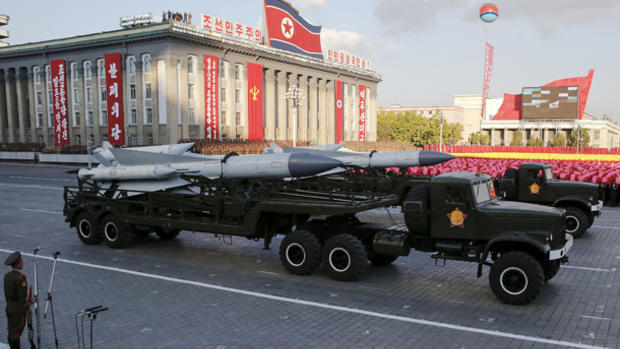N. Korea fires missile, vows to boost "nuclear deterrence"
SEOUL, South Korea -- North Korea fired a short-range missile into the sea and warned it would continue developing its nuclear weapons on Friday, hours after the U.S., South Korean and Japanese leaders pledged to work closer together to prevent the North from advancing its nuclear and missile programs.
The surface-to-air missile fired from an eastern coastal area flew into waters off the North's east coast, South Korea's Joint Chiefs of Staff said in a statement. It gave no further details.
The missile is the latest in a series of weapon launches by the North in an apparent response to ongoing military exercises between the United States and South Korea. North Korea views the drills as an invasion rehearsal.
"If the United States continues (drills with the South), then we have to make the countermeasures also, as I told you. So, we have to develop and we have to make more deterrence, nuclear deterrence," the North's ambassador to the United Nations, So Se Pyong, told the Reuters news agency in Geneva.
So told Retuers the military exercises were an overt U.S. threat of "decapitation of the supreme leadership" of North Korea, adding that the peninsual was in a state of "semi-war."
This year's drills, set to run until late April, are the biggest, and come after North Korea's nuclear test and long-range rocket test earlier this year.
In Washington, President Obama on Thursday met with his South Korean and Japanese counterparts to discuss ways of deterring North Korea's nuclear threats before a two-day nuclear summit that opens Friday. Obama also met Chinese President Xi Jinping and both called for North Korea to give up its nuclear weapons. China also agreed to implement in full the latest economic restrictions imposed by the U.N. Security Council against Pyongyang.
"Of great importance to both of us is North Korea's pursuit of nuclear weapons, which threatens the security and stability of the region. President Xi and I are both committed to the denuclearization of the Korean Peninsula," Mr. Obama said at the start of his meeting with Xi.
"China and the U.S. have a responsibility to work together," Xi said in his comments made to reporters through an interpreter. As for their "disputes and disagreements," the Chinese leader said the two sides could "seek active solutions through dialogue and consultation."
North Korea's fourth nuclear test in January, followed by a space a launch in February, have heralded more convergence among often-fractious powers in East Asia -- at least on the need to press the government of Kim Jong Un toward disarming.
On Tuesday, North Korea fired a short-range projectile that crashed on land in the country's northeast, according to South Korean defense officials. The launch prompted media speculation in South Korea that Pyongyang may have used a land target to test the accuracy of its weapons. In the past, the North has usually fired missiles, artillery shells and rockets into the sea.
Earlier this month, North Korea fired its first medium-range missile into the sea since early 2014.
Along with missile and artillery launches, North Korea has also repeated threats of nuclear strikes on Seoul and Washington and warned it would tests a nuclear warhead and ballistic missiles capable of carrying it.
Also Friday, South Korea blamed North Korea for sending radio waves to jam GPS signals in South Korea, calling it a provocation. There were no reports of major disruptions in South Korean military, air and naval transport and telecommunication systems.
Media reported that some fishing boats suffered problems in their GPS navigation systems.
